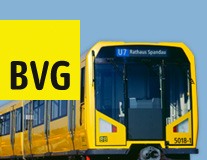| Golden
Age Technologies |
 The
public transportation system of the city of Berlin, know as BVG, has made
a worldwide debut with a bus equipped with liquid hydrogen fuel cells.
According to their website, the bus is part of the BVG’s standard fleet
operating within the city. Liquid hydrogen fuel cells represent the ecological
trend of the the future: there are no exhaust fumes and the raw material
it is created from is unlimited. The project is being sponsored by the
government.[1]
The
public transportation system of the city of Berlin, know as BVG, has made
a worldwide debut with a bus equipped with liquid hydrogen fuel cells.
According to their website, the bus is part of the BVG’s standard fleet
operating within the city. Liquid hydrogen fuel cells represent the ecological
trend of the the future: there are no exhaust fumes and the raw material
it is created from is unlimited. The project is being sponsored by the
government.[1]
The principle behind
fuel cells has been around for longer than commonly supposed. It was
developed in 1830 by Sir William Robert Grove (1811-1896). The underlying
chemical reaction changes hydrogen and oxygen to water; in the fuel cell,
the chemical energy of the fuel is directly transformed into electrical
energy. The result is a higher than average efficiency (up to 83%)[2].
Sir William Robert Grove discovered the principle when he was experimenting
with going from water to hydrogen and oxygen by means of electrolysis
(separation of a chemical compound by an electric current[3]).
He noticed that the process could also be reversed.[4]
The problem then, and still today, is the necessary materials. For example,
platinum is required as a catalyst (the substance that increases the rate
of a chemical reaction without itself undergoing any change[5]).
Now that this technology has found application in space travel and that
corrosion resistant materials have been developed, it is receiving more
attention than ever as interest in environmentally friendly fuels peaks.
The Berlin bus is one example. ![]()
1 http://www.bvg.de/index.php/de/Bvg/Detail/folder/335/
id/509/nb/1/name/Neue+Technologien+bei+der+BVG
2 http://www.hycar.de/
3 http://de.wikipedia.org/wiki/Elektrolyse
4 http://www.diebrennstoffzelle.de/zelltypen/geschichte/index.shtml
5 http://de.wikipedia.org/wiki/Katalysator
| << | Contents | >> |
| Refer
this page to friends |
||